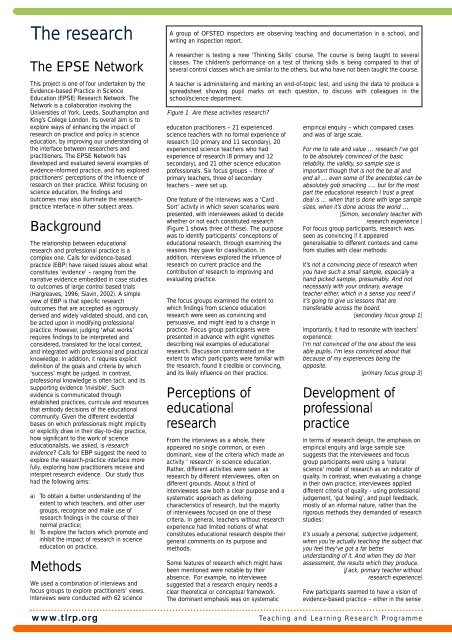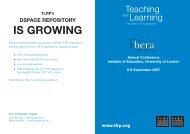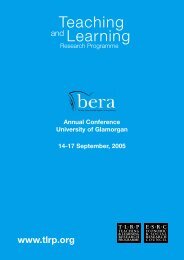Towards Evidence-based Practice in Science Education 4
Towards Evidence-based Practice in Science Education 4
Towards Evidence-based Practice in Science Education 4
Create successful ePaper yourself
Turn your PDF publications into a flip-book with our unique Google optimized e-Paper software.
The research<br />
The EPSE Network<br />
This project is one of four undertaken by the<br />
<strong>Evidence</strong>-<strong>based</strong> <strong>Practice</strong> <strong>in</strong> <strong>Science</strong><br />
<strong>Education</strong> (EPSE) Research Network. The<br />
Network is a collaboration <strong>in</strong>volv<strong>in</strong>g the<br />
Universities of York, Leeds, Southampton and<br />
K<strong>in</strong>g’s College London. Its overall aim is to<br />
explore ways of enhanc<strong>in</strong>g the impact of<br />
research on practice and policy <strong>in</strong> science<br />
education, by improv<strong>in</strong>g our understand<strong>in</strong>g of<br />
the <strong>in</strong>terface between researchers and<br />
practitioners. The EPSE Network has<br />
developed and evaluated several examples of<br />
evidence-<strong>in</strong>formed practice, and has explored<br />
practitioners’ perceptions of the <strong>in</strong>fluence of<br />
research on their practice. Whilst focus<strong>in</strong>g on<br />
science education, the f<strong>in</strong>d<strong>in</strong>gs and<br />
outcomes may also illum<strong>in</strong>ate the researchpractice<br />
<strong>in</strong>terface <strong>in</strong> other subject areas.<br />
Background<br />
The relationship between educational<br />
research and professional practice is a<br />
complex one. Calls for evidence-<strong>based</strong><br />
practice (EBP) have raised issues about what<br />
constitutes ‘evidence’ – rang<strong>in</strong>g from the<br />
narrative evidence embedded <strong>in</strong> case studies<br />
to outcomes of large control <strong>based</strong> trials<br />
(Hargreaves, 1996; Slav<strong>in</strong>, 2002). A simple<br />
view of EBP is that specific research<br />
outcomes that are accepted as rigorously<br />
derived and widely validated should, and can,<br />
be acted upon <strong>in</strong> modify<strong>in</strong>g professional<br />
practice. However, judg<strong>in</strong>g ‘what works’<br />
requires f<strong>in</strong>d<strong>in</strong>gs to be <strong>in</strong>terpreted and<br />
considered, translated for the local context,<br />
and <strong>in</strong>tegrated with professional and practical<br />
knowledge. In addition, it requires explicit<br />
def<strong>in</strong>ition of the goals and criteria by which<br />
‘success’ might be judged. In contrast,<br />
professional knowledge is often tacit, and its<br />
support<strong>in</strong>g evidence ‘<strong>in</strong>visible’. Such<br />
evidence is communicated through<br />
established practices, curricula and resources<br />
that embody decisions of the educational<br />
community. Given the different evidential<br />
bases on which professionals might implicitly<br />
or explicitly draw <strong>in</strong> their day-to-day practice,<br />
how significant to the work of science<br />
educationalists, we asked, is research<br />
evidence? Calls for EBP suggest the need to<br />
explore the research-practice <strong>in</strong>terface more<br />
fully, explor<strong>in</strong>g how practitioners receive and<br />
<strong>in</strong>terpret research evidence. Our study thus<br />
had the follow<strong>in</strong>g aims:<br />
a) To obta<strong>in</strong> a better understand<strong>in</strong>g of the<br />
extent to which teachers, and other user<br />
groups, recognise and make use of<br />
research f<strong>in</strong>d<strong>in</strong>gs <strong>in</strong> the course of their<br />
normal practice;<br />
b) To explore the factors which promote and<br />
<strong>in</strong>hibit the impact of research <strong>in</strong> science<br />
education on practice.<br />
Methods<br />
We used a comb<strong>in</strong>ation of <strong>in</strong>terviews and<br />
focus groups to explore practitioners’ views.<br />
Interviews were conducted with 62 science<br />
www.tlrp.org<br />
A group of OFSTED <strong>in</strong>spectors are observ<strong>in</strong>g teach<strong>in</strong>g and documentation <strong>in</strong> a school, and<br />
writ<strong>in</strong>g an <strong>in</strong>spection report.<br />
A researcher is test<strong>in</strong>g a new ‘Th<strong>in</strong>k<strong>in</strong>g Skills’ course. The course is be<strong>in</strong>g taught to several<br />
classes. The children’s performance on a test of th<strong>in</strong>k<strong>in</strong>g skills is be<strong>in</strong>g compared to that of<br />
several control classes which are similar to the others, but who have not been taught the course.<br />
A teacher is adm<strong>in</strong>ister<strong>in</strong>g and mark<strong>in</strong>g an end-of-topic test, and us<strong>in</strong>g the data to produce a<br />
spreadsheet show<strong>in</strong>g pupil marks on each question, to discuss with colleagues <strong>in</strong> the<br />
school/science department.<br />
Figure 1 Are these activities research?<br />
education practitioners – 21 experienced<br />
science teachers with no formal experience of<br />
research (10 primary and 11 secondary), 20<br />
experienced science teachers who had<br />
experience of research (8 primary and 12<br />
secondary), and 21 other science education<br />
professionals. Six focus groups – three of<br />
primary teachers, three of secondary<br />
teachers – were set up.<br />
One feature of the <strong>in</strong>terviews was a ‘Card<br />
Sort’ activity <strong>in</strong> which seven scenarios were<br />
presented, with <strong>in</strong>terviewees asked to decide<br />
whether or not each constituted research<br />
(Figure 1 shows three of these). The purpose<br />
was to identify participants’ conceptions of<br />
educational research, through exam<strong>in</strong><strong>in</strong>g the<br />
reasons they gave for classification. In<br />
addition, <strong>in</strong>terviews explored the <strong>in</strong>fluence of<br />
research on current practice and the<br />
contribution of research to improv<strong>in</strong>g and<br />
evaluat<strong>in</strong>g practice.<br />
The focus groups exam<strong>in</strong>ed the extent to<br />
which f<strong>in</strong>d<strong>in</strong>gs from science education<br />
research were seen as conv<strong>in</strong>c<strong>in</strong>g and<br />
persuasive, and might lead to a change <strong>in</strong><br />
practice. Focus group participants were<br />
presented <strong>in</strong> advance with eight vignettes<br />
describ<strong>in</strong>g real examples of educational<br />
research. Discussion concentrated on the<br />
extent to which participants were familiar with<br />
the research, found it credible or conv<strong>in</strong>c<strong>in</strong>g,<br />
and its likely <strong>in</strong>fluence on their practice.<br />
Perceptions of<br />
educational<br />
research<br />
From the <strong>in</strong>terviews as a whole, there<br />
appeared no s<strong>in</strong>gle common, or even<br />
dom<strong>in</strong>ant, view of the criteria which made an<br />
activity ‘ research’ <strong>in</strong> science education.<br />
Rather, different activities were seen as<br />
research by different <strong>in</strong>terviewees, often on<br />
different grounds. About a third of<br />
<strong>in</strong>terviewees saw both a clear purpose and a<br />
systematic approach as def<strong>in</strong><strong>in</strong>g<br />
characteristics of research, but the majority<br />
of <strong>in</strong>terviewees focused on one of these<br />
criteria. In general, teachers without research<br />
experience had limited notions of what<br />
constitutes educational research despite their<br />
general comments on its purpose and<br />
methods.<br />
Some features of research which might have<br />
been mentioned were notable by their<br />
absence. For example, no <strong>in</strong>terviewee<br />
suggested that a research enquiry needs a<br />
clear theoretical or conceptual framework.<br />
The dom<strong>in</strong>ant emphasis was on systematic<br />
empirical enquiry – which compared cases<br />
and was of large scale.<br />
For me to rate and value … research I’ve got<br />
to be absolutely conv<strong>in</strong>ced of the basic<br />
reliability, the validity, so sample size is<br />
important though that is not the be all and<br />
end all … even some of the anecdotes can be<br />
absolutely gob smack<strong>in</strong>g …. but for the most<br />
part the educational research I trust a great<br />
deal is … when that is done with large sample<br />
sizes, when it’s done across the world …<br />
[Simon, secondary teacher with<br />
research experience ]<br />
For focus group participants, research was<br />
seen as conv<strong>in</strong>c<strong>in</strong>g if it appeared<br />
generalisable to different contexts and came<br />
from studies with clear methods:<br />
It’s not a conv<strong>in</strong>c<strong>in</strong>g piece of research when<br />
you have such a small sample, especially a<br />
hand picked sample, presumably. And not<br />
necessarily with your ord<strong>in</strong>ary, average<br />
teacher either, which <strong>in</strong> a sense you need if<br />
it’s go<strong>in</strong>g to give us lessons that are<br />
transferable across the board.<br />
[secondary focus group 1]<br />
Importantly, it had to resonate with teachers’<br />
experience:<br />
I'm not conv<strong>in</strong>ced of the one about the less<br />
able pupils. I'm less conv<strong>in</strong>ced about that<br />
because of my experiences be<strong>in</strong>g the<br />
opposite.<br />
[primary focus group 3]<br />
Development of<br />
professional<br />
practice<br />
In terms of research design, the emphasis on<br />
empirical enquiry and large sample size<br />
suggests that the <strong>in</strong>terviewees and focus<br />
group participants were us<strong>in</strong>g a ‘natural<br />
science’ model of research as an <strong>in</strong>dicator of<br />
quality. In contrast, when evaluat<strong>in</strong>g a change<br />
<strong>in</strong> their own practice, <strong>in</strong>terviewees applied<br />
different criteria of quality - us<strong>in</strong>g professional<br />
judgement, ‘gut feel<strong>in</strong>g’, and pupil feedback,<br />
mostly of an <strong>in</strong>formal nature, rather than the<br />
rigorous methods they demanded of research<br />
studies:<br />
It’s usually a personal, subjective judgement,<br />
when you’re actually teach<strong>in</strong>g the subject that<br />
you feel they've got a far better<br />
understand<strong>in</strong>g of it. And when they do their<br />
assessment, the results which they produce.<br />
[Jack, primary teacher without<br />
research experience]<br />
Few participants seemed to have a vision of<br />
evidence-<strong>based</strong> practice – either <strong>in</strong> the sense<br />
Teach<strong>in</strong>g and Learn<strong>in</strong>g Research Programme

















